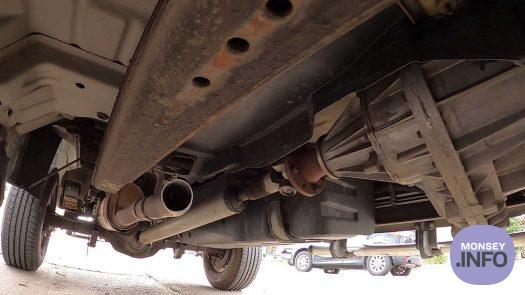
Justice Department Announces Takedown of Nationwide Catalytic Converter Theft Ring
Federal, state, and local law enforcement partners from across the United States executed a nationwide, coordinated takedown today of leaders and associates of a national network of thieves, dealers, and processors for their roles in conspiracies involving stolen catalytic converters sold to a metal refinery for tens of millions of dollars.
Arrests, searches, and seizures took place in California, Oklahoma, Wyoming, Minnesota, New Jersey, New York, Nevada, North Carolina, and Virginia. In total, 21 individuals in five states have been arrested and/or charged for their roles in the conspiracy.
The 21 defendants are charged in two separate indictments that were unsealed today in the Eastern District of California and the Northern District of Oklahoma following extensive law enforcement arrest and search operations. In addition to the indictments, over 32 search warrants were executed, and law enforcement seized millions of dollars in assets, including homes, bank accounts, cash, and luxury vehicles.
“Amidst a rise in catalytic converter thefts across the country, the Justice Department has today carried out an operation arresting 21 defendants and executing 32 search warrants in a nation-wide takedown of a multimillion-dollar catalytic converter theft network,” said Attorney General Merrick B. Garland. “We will continue to work alongside our state and local partners to disrupt criminal conspiracies like this one that target the American people.”
Catalytic Converters
Catalytic converters are a component of an automotive vehicle’s exhaust device that reduce the toxic gas and pollutants from a vehicle’s internal combustion engine into safe emissions. Catalytic converters use precious metals in their center, or “core”, and are regularly targeted for theft due to the high value of these metals, especially the precious metals palladium, platinum, and rhodium. Some of these precious metals are more valuable per ounce than gold and their value has been increasing in recent years. The black-market price for catalytic converters can be above $1,000 each, depending on the type of vehicle and what state it is from. They can be stolen in less than a minute. Additionally, catalytic converters often lack unique serial numbers, VIN information, or other distinctive identification features, making them difficult to trace to their lawful owner. Thus, the theft of catalytic converters has become increasingly popular because of their value, relative ease to steal, and their lack of identifying markings.
Eastern District of California Case
A federal grand jury in the Eastern District of California returned a 40‑count indictment charging nine defendants with conspiracy to transport stolen catalytic converters, conspiracy to commit money laundering, and other related charges.
According to court documents, brothers Tou Sue Vang, 31, and Andrew Vang, 27, and Monica Moua, 51, all of Sacramento, California, allegedly operated an unlicensed business from their personal residence in Sacramento where they bought stolen catalytic converters from local thieves and shipped them to DG Auto Parts LLC (DG Auto) in New Jersey for processing. The Vang family allegedly sold over $38 million in stolen catalytic converters to DG Auto.
Defendants Navin Khanna, aka Lovin Khanna, 39; Tinu Khanna, aka Gagan Khanna, 35; Daniel Dolan, 44; Chi Mo, aka David Mo, 37; Wright Louis Mosley, 50; and Ishu Lakra, 24, all of New Jersey, operated DG Auto in multiple locations in New Jersey. They knowingly purchased stolen catalytic converters and, through a “de-canning” process, extracted the precious metal powders from the catalytic core. DG Auto sold the precious metal powders it processed from California and elsewhere to a metal refinery for over $545 million.
Northern District of Oklahoma Case
A federal grand jury in the Northern District of Oklahoma returned a 40‑count indictment charging 13 defendants with conspiracy to receive stolen catalytic converters, conspiracy to commit money laundering, and other related charges.
According to court documents, together the defendants bought stolen catalytic converters from thieves on the street, then re-sold and shipped them to DG Auto in New Jersey for processing. Over the course of the conspiracy, defendant Tyler James Curtis received over $13 million in wired funds from DG Auto for the shipment of catalytic converters and received over $500,000 from Capital Cores for catalytic converters. Defendant Adam G. Sharkey received over $45 million in wired funds from DG Auto. And defendant Martynas Macerauskas received over $6 million in payments from DG Auto for catalytic converters. In all these incidents, most of the catalytic converters sold to DG Auto were stolen, and DG Auto knew or should have known that when they paid for them.
The 13 defendants are Navin Khanna, 39, of Holmdel, New Jersey; Adam Sharkey, 26, of West Islip, New York; Robert Gary Sharkey, 57, of Babylon, New York; Tyler James Curtis, 26, of Wagoner, Oklahoma; Benjamin Robert Mansour, 24, of Bixby, Oklahoma; Reiss Nicole Biby, 24, of Wagoner, Oklahoma; Martynas Macerauskas, 28, of Leila Lake, Texas; Kristina McKay Macerauskas, 21, of Leila Lake, Texas; Parker Star Weavel, 25, of Tahlequah, Oklahoma; Shane Allen Minnick, 26, of Haskell, Oklahoma; Ryan David LaRue 29, of Broken Bow, Oklahoma; Brian Pate Thomas, 25, of Choteau, Oklahoma; and Michael Anthony Rhoden, 26, of Keifer, Oklahoma.
Trial Attorney Danbee C. Kim of the Criminal Division’s Organized Crime and Gang Section, Assistant U.S. Attorney Veronica M.A. Alegría for the Eastern District of California, and Assistant U.S. Attorneys Reagan Reininger and David Nasar for the Northern District of Oklahoma are prosecuting the cases.









